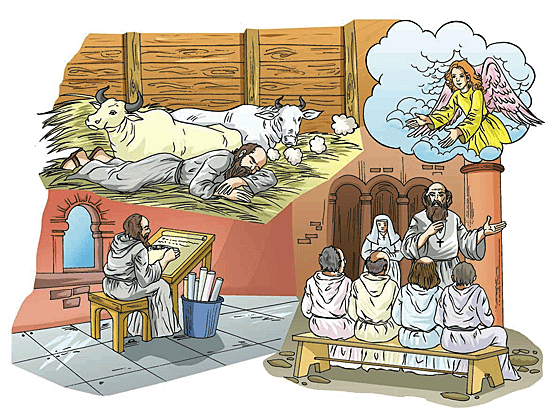English and Its Historical Development, Part 10C
(Caedmon wrote what became known as "Caedmon's Hymn" in A.D. 657-680)
In A.D. 657-680, Caedmon, lay brother at the monastery of Whitby, wrote what became known as "Caedmon's Hymn" which is the first English poem whose authorship is known.

Caedmon was the earliest Christian poet of England known by name
According to Bede, he was an uneducated herdsman who in his old age received a divine call in a dream to sing of the Creation.
A gentle and self-effacing cowherd, one night Caedmon became miraculously endowed with the gift of song. An angel appeared to him in a dream as he lay in the straw near his cattle, and told him: "Your mission on earth is to tell the story of the Scriptures and to sing praises to the glory of God."
From being a herdsman, he became a monk at Whitby under the rule of St. Hilda, where he turned other biblical themes into vernacular poetry; however, the original hymn of the Creation, only nine lines long, is the only extant poem that can be attributed to him with any certainty.
Although we do not have his poems on Genesis, Exodus, Daniel, etc.; the poems on these subjects which do exist were very likely inspired by his example.
The literature of Old English indicated the richness of the Anglo-Saxon period through its poetry and prose.
The literature of Old English indicates the richness of the Anglo-Saxon period through its poetry and prose.
English was the first European language, after the fall of Rome, to develop polished literary prose. More than half of the Anglo-Saxon poetry was concerned with Christian topics.
Translations and paraphrases of books of the Old and New Testaments, legends of saints, and devotional and didactic pieces constitute the bulk of this verse.
Proceed to Part 11, Beowulf.
INDEX or Table of Contents, English and its historical development.
References: sources of information.
